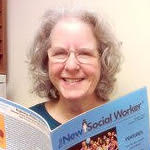An Interview with Linda May Grobman
 Linda May Grobman, MSW, LSW, ACSW, is the founder, publisher, and editor of THE NEW SOCIAL WORKER magazine and administrator of SocialWorkJobBank. She is passionate about mental health, racial equity, and social workers’ career development (among other issues) and has been a mentor to many new social work writers. She has a bachelor’s degree in music therapy, a master’s in social work, and is a Certified Music Practitioner. She has edited four books in the Days in the Lives of Social Workers series. Linda can be found on Twitter and Facebook.
Linda May Grobman, MSW, LSW, ACSW, is the founder, publisher, and editor of THE NEW SOCIAL WORKER magazine and administrator of SocialWorkJobBank. She is passionate about mental health, racial equity, and social workers’ career development (among other issues) and has been a mentor to many new social work writers. She has a bachelor’s degree in music therapy, a master’s in social work, and is a Certified Music Practitioner. She has edited four books in the Days in the Lives of Social Workers series. Linda can be found on Twitter and Facebook.
We would like to thank Linda May Grobman for taking the time to chat with us today.
1. What brought you into the field of social work?
I think it was a process of finding social work. I had gotten my bachelor’s in music therapy. Even before that, I had always done volunteer work as a teenager. So, music therapy combined my love for making music and my desire to do something meaningful with people. I later found that social work really encompassed the things I wanted to do, my way of thinking, and the way I wanted to live my life, so I got my master’s in social work.
2. How has your career grown and developed over time?
I started as a social worker in mental health and medical settings. In those settings, I always looked at the bigger picture, as well, and got involved in things like starting new programs and educating other disciplines about what social workers do. I was interested in the issues that social workers face as a profession, so eventually worked at two state chapters of the National Association of Social Workers before starting a publishing business to address the issues social workers face in their career development. I started THE NEW SOCIAL WORKER magazine in 1994 and began publishing books for social workers in 1996.
3. What do you see as the top social issues facing social workers today?
There are many. The issues of “ism”s—racism, sexism, and many others—are foremost in my mind. Mental health issues—how we treat them and the stigma associated with such treatment—are important. Burnout and the need for self-care are huge in our society, and social workers are at high risk. There are so many others.
4. What advice would you give to new social workers entering the field?
First and foremost, make sure that your degree is from a school that is accredited by the Council on Social Work Education (CSWE), if you want to be a professional social worker. Other degrees do not allow you entry into the profession. Find good mentors and supervisors to learn from. Be open to a variety of experiences. The profession offers such a wide variety of opportunities—don’t limit yourself to just one area.
5. Would you do anything different in your education or professional experience if you had the opportunity?
Not really. Each experience I have had has led to new opportunities and has allowed me to learn and grow. I might sometimes wonder how things would have been different if I had taken a different path, but I can’t say that I would do anything differently, knowing that everything I’ve done has led me to where I am now.
6. What do you consider to be your greatest strength in your job?
I have a lot of curiosity about people and issues. I like to read everything I can about a subject to learn as much as I can. Each person’s strengths are different, so I would say to find what your strengths are and build on them.
7. What can social worker students do to improve their competitive edge in the current job market?
Having a variety of internships and volunteer experiences can help you stand out. Getting involved in extracurricular activities, such as the school’s social work club or other organizations on campus can give you additional experiences that will be useful, especially if you take on a leadership role. If you like to write, try to write for campus or other publications, or start a blog. Make sure that your social media profiles are up-to-date and professional.
8. Social work can be rewarding but challenging as well. What self-care strategies do you recommend for new social workers?
I recommend finding the self-care strategies that work best for you. Taking care of yourself physically is of utmost importance. You may find certain activities relaxing, such as listening to music or going for a walk. If you are feeling some stress that is affecting your work at your field placement, talk to your supervisor about it—that is what they are there for. If you feel that therapy would help, find a good therapist to talk to.
